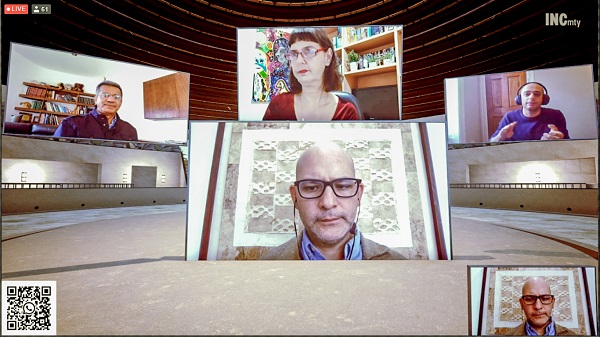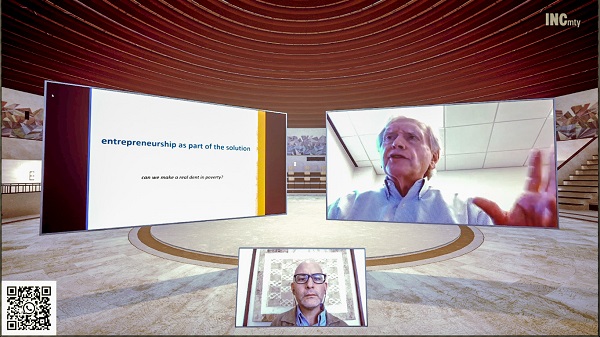Researchers from different universities and countries presented their work at the third edition of the International Entrepreneurship Research Meeting.
By JOSÉ ÁNGEL DE LA PAZ | EGADE BUSINESS SCHOOL
As part of the III International Meeting on Entrepreneurship Research, INCmty 2020 opened up a space for actors and agents of change to discuss entrepreneurial education and new regional development schemes.
Under the theme of “Entrepreneurship for human flourishing,” EGADE Business School, the Eugenio Garza Lagüera Entrepreneurship Institute of Tecnológico de Monterrey, and the University of Cantabria organized a virtual event on November 2nd and 3rd of this year.
In addition to panels and conferences, it included the presentation of 28 papers on three lines of research: "Entrepreneurial education," "Social entrepreneurship" and "Ecosystems and regional entrepreneurship" by 55 authors from 14 universities in Mexico, Colombia, Bolivia, Ecuador and Spain.
"The times we live in require a new profile in terms of conscious, social entrepreneurship without forgetting business profitability," said Ignacio de la Vega, Dean of EGADE Business School, at the opening of the event.
He was accompanied at the inauguration by Osmar Zavaleta, Associate Dean of Research at EGADE Business School; José Ernesto Amorós, National Director of Doctoral Programs at EGADE Business School; Geraldina Silveyra, Academic Director of the Eugenio Garza Lagüera Entrepreneurship Institute; and Concepción López Fernández, Director of the Santander Chair of Family Business at the University of Cantabria.
Participants as this edition of the international meeting discussed how, in the specific context of entrepreneurship, research on human flourishing and well-being is still only in its initial stages.
Some research shows that innovation and entrepreneurship not only drive economic growth, but also increase life satisfaction, since entrepreneurship is a potential source of personal development, growth, and well-being.
Unlike in other economic activities, entrepreneurs enjoy a level of freedom and control that allows them to obtain a greater sense of purpose with respect to their work, make use of their innate talents and abilities, and participate in meaningful activities through self-directed tasks.

FOCUS ON WELLNESS
In the panel “Alternatives to traditional entrepreneurship models focused on human well-being and flourishing,” Matthew Guttentag, Director of Research and Impact at the Aspen Network of Development Entrepreneurs (ANDE), pointed out that it is not only important to support entrepreneurs, but also to support the surrounding institutions.
Jesús Campos, Director of CIIESS at the Ibero-American University (IBERO), called for people to promote the research and practices of the social and solidarity economy as a way of detonating the potential of people in conditions of poverty and vulnerability.
Meanwhile, Dafna Kariv, Professor of Entrepreneurship and Head of the Capstone Program at Adelson School of Entrepreneurship - IDC Herzliya, cautioned that public support programs tend to prioritize and protect established organizations, while neglecting small companies, startups, and entrepreneurial ventures.
“This situation has been aggravated by the COVID-19 crisis. Investment in startups has decreased. Startups are experiencing difficulties with liquidity and laying off employees, while large companies are hiring,” she said.
However, startups are thriving in some sectors, such as medical and communication technology; in others, startup sales have increased dramatically, with financial support exploding and expanding.
"Startups are simultaneously one of the sectors most negatively affected by COVID-19 and one of the most ‘fortunate’ sectors to be affected by the crisis," she said.

EMPOWERMENT AND TRANSFORMATION
In his conference “Entrepreneurship and innovation to alleviate poverty,” Michael Morris, Professor of Entrepreneurship and Social Innovation at the University of Notre Dame, argued that, when thinking about entrepreneurship, we must do so in terms of empowerment and transformation.
“Empowerment to create your own work and work for others, to create your own identity, future, sense of pride and worth; and transformation to transform markets, business practices, industries, your own self, your family, communities and economies,” he said.
And this approach must not lose sight of a reality in which 22 percent of the world's population lives in poverty and 10 percent in extreme poverty.
"Entrepreneurship is part of the solution," Morris said.